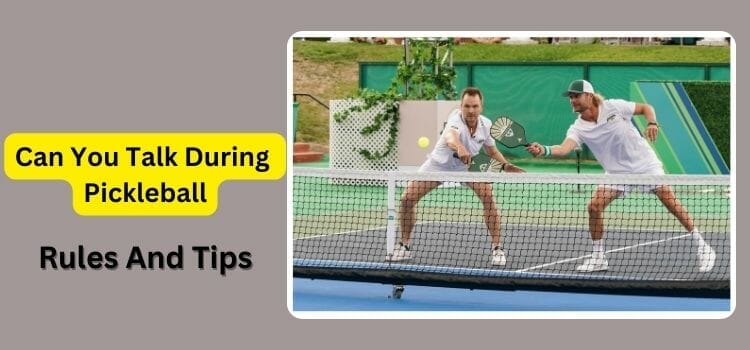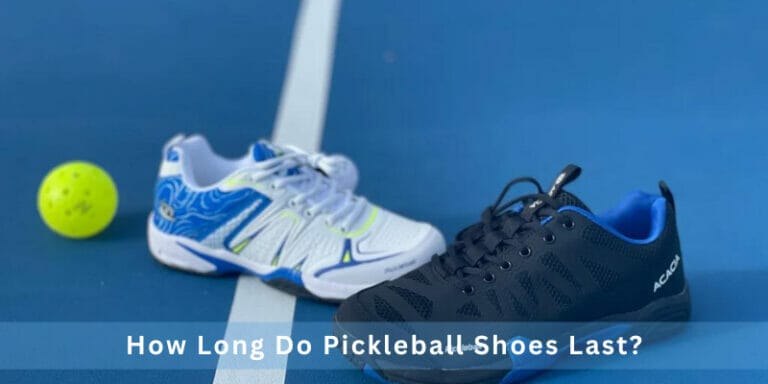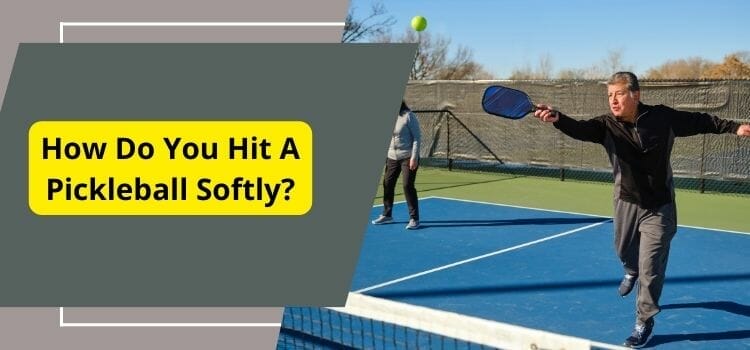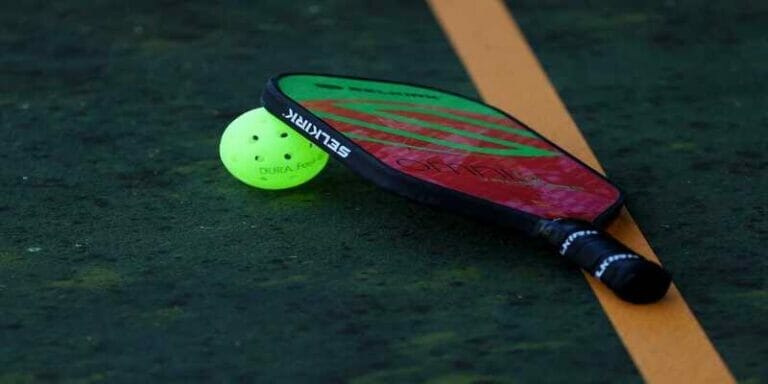Can You Talk During Pickleball – Rules And Tips

Picture this: You’re on the pickleball court, paddle in hand, ready to rally. The sun is shining, the competition is fierce, and excitement fills the air. But wait…can you talk during pickleball? Is communication allowed in this fast-paced sport?
Absolutely! In pickleball, conversation is part of the fun. During casual matches, talking with your partner is encouraged, fostering teamwork and camaraderie. But in official matches, be respectful and don’t distract opponents or use bad language.
Here I’ll uncover the rules and tips for talking during pickleball. Whether you’re a seasoned player or just starting out, understanding the role of communication can take your game to new heights. So let’s dive into the world of pickleball chatter and discover how it can enhance your performance on the court!
Can You Talk During Pickleball
One of the questions that often comes up in pickleball is whether or not talking is allowed during gameplay. The answer to this question is a resounding yes
According to the official rules of pickleball, there is no specific prohibition against talking. However, the rules do emphasize sportsmanship and respect for your fellow players. Excessive talking or disruptive behavior can be considered a breach of etiquette, and players are encouraged to maintain a quiet and respectful atmosphere on the court.
Here are the following points you should keep in mind while playing pickleball:
- Quiet Conversations: You can have quiet conversations with your partner or teammates between points or during stoppages in play, such as when retrieving balls.
- Communication with Partner: It’s essential to communicate with your doubles partner during a match. You can use verbal cues to strategize, coordinate movements, and call the ball to avoid collisions.
- Respect Opponents: While talking is allowed, it’s important to be respectful to your opponents. Avoid excessive noise, trash talk, or any behavior that may distract or disrupt your opponents’ concentration.
- Limit Noise: Excessive noise, shouting, or loud conversations that disrupt other players on nearby courts should be avoided. It’s important to maintain a reasonable noise level.
Talking during a game of pickleball is not just allowed but highly encouraged. Effective communication can enhance teamwork, coordination, and overall enjoyment of the sport
Professional Pickleball Players And Communication
Communication is essential for professional pickleball players. They need to be able to communicate effectively with their partners in order to coordinate their shots and movements. They also need to be able to communicate with their opponents in a respectful and sportsmanlike manner.
Here are some specific communication skills that are important for professional pickleball players:
Verbal Communication
Professional pickleball players must articulate their intentions clearly and concisely to their partners. This includes promptly and accurately calling out the ball’s location, their own positioning on the court, and their strategic approach.
Non-Verbal Communication
Professional pickleball players also need to be able to communicate effectively through non-verbal cues. This includes things like eye contact, body language, and facial expressions.
Active Listening
Active listening is a vital skill for professional pickleball players. They must pay close attention to their partners and opponents, comprehending their statements and perspectives fully.
Conflict Resolution
Conflict can arise during competitive matches. Professional pickleball players must demonstrate the ability to resolve conflicts respectfully and constructively. This involves actively listening to the opposing viewpoint, seeking compromise, and finding mutually beneficial solutions to disputes.
Why Is It Important To Talk During Pickleball?

Why is it important to talk during pickleball? Communication plays a vital role in any team sport, and pickleball is no exception. Talking on the court allows players to coordinate their movements, strategize, and make split-second decisions together.
Here are some key points explaining why it is important to talk during pickleball:
- It helps you communicate with your partner: This is especially important in doubles, where you need to be able to coordinate your shots and movements. Talking allows you to let your partner know where you are, what you are doing, and what you need them to do.
- It helps you stay focused: Talking can help you stay alert and engaged in the game. It can also help you to stay calm and positive, which can be important in high pressure situations.
- It can be fun: Talking can add a bit of excitement and camaraderie to the game. It can also help to build relationships with your opponents and fellow players.
- Enhancing Decision-Making: Communication enables quick decision-making during fast-paced rallies.
Different Strategies For Talking During Pickleball
Communication on the pickleball court can greatly enhance your gameplay and increase your chances of winning. While there are no specific rules about talking during pickleball, it is important to develop effective strategies for communication. Here are some different strategies you can implement:
1. Strategic Planning
Before each point, take a moment to discuss tactics with your partner. This can involve deciding who will cover which areas of the court or devising a plan to exploit weaknesses in your opponent’s game.
2. Calling Shots
When hitting a shot, it’s helpful to call out the intended direction or target area. This allows your partner to anticipate where the ball will go and adjust their position accordingly.
3. Encouragement and Motivation
Positive reinforcement is key in any sport, including pickleball. Words of encouragement can boost morale and help maintain focus throughout the match.
4. Warning Signals
If you notice an opponent preparing for a powerful shot or attempting a surprise move, communicate this information to your partner using pre-determined signals or code words.
5. Non-verbal Communication
Non-verbal communication plays a significant role in pickleball strategy. Eye contact, hand gestures, and body positioning can convey important messages without uttering a word.
By implementing these various strategies for talking during pickleball, you can improve teamwork and coordination on the court while keeping opponents guessing about your next move!
Tips On How To Effectively Talk During Pickleball

Effective communication on the pickleball court is vital for success. Here are some tips to help you communicate effectively during your games:
1. Clear and Concise Communication
In the heat of the game, it’s important to keep your communication clear and concise. Use simple words or phrases to convey your message quickly without confusing your partner or opponents.
2. Utilizing Hand Signals
Non-verbal cues can be extremely helpful in communicating with your partner during fast paced rallies. Develop a set of hand signals that both you and your partner understand, such as a thumbs up for a “good shot” or pointing toward a specific area of the court for strategy adjustments.
3. Avoiding Arguments and Disputes
Keep conversations positive and respectful to maintain good sportsmanship on the court. If there is a disagreement between teammates, address it calmly after the game rather than arguing during play.
4. Timing and Appropriateness of Communication
Choose moments wisely when talking during pickleball matches. Excessive chatter can distract not only yourself but also others on nearby courts, so save discussions for timeouts or breaks between points.
Effective communication can improve teamwork, coordination, and strategizing on the pickleball court! By following these tips, you’ll enhance your overall performance while enjoying this exciting sport!
Benefits Of Talking During Pickleball
When it comes to playing pickleball, communication is key. Talking during a game can have numerous benefits that can enhance your overall performance on the court.
Here are the benefits of talking during pickleball:
- Improved Coordination: Talking with your partner helps in coordinating your movements and actions on the court, ensuring you both work together seamlessly.
- Enhanced Strategy: Communication allows you to strategize in real time. You can discuss which shots to play, where to place the ball, and how to exploit your opponent’s weaknesses.
- Reduced Confusion: Verbal cues such as calling “mine” or “yours” reduce confusion and prevent accidental collisions with your partner.
- Increased Focus: Engaging in conversation during the game can help you stay mentally focused and sharp. It keeps your mind actively involved in the match.
- Boosted Confidence: Encouraging words and positive feedback from your partner can boost your confidence, making you feel more capable and motivated to perform your best.
- Adaptation to Conditions: Talking helps you adapt to changing conditions like wind or the opponent’s strategy, allowing you to make necessary adjustments.
Whether it’s coordinating strategies with your doubles partner or simply cheering each other on after a great shot, talking during pickleball has numerous benefits that contribute to a more enjoyable and successful experience on the court
Conclusion
Talking during pickleball is allowed but also highly encouraged. Effective communication on the court can greatly enhance your gameplay and increase your chances of winning. Whether you’re playing casually with friends or competing at a professional level, clear and concise communication can make all the difference.
By utilizing hand signals, avoiding arguments and disputes, and being mindful of timing and appropriateness, you can effectively communicate with your partner to strategize, coordinate shots, and react quickly to game situations.
Pickleball is a team sport, and teamwork relies on effective communication. So next time you step onto the pickleball court, don’t be afraid to talk! Engage in open dialogue with your partner and enjoy the benefits it brings to your game.
FAQS
Are there penalties for excessive talking in pickleball?
While there are no specific penalties outlined in the official rules, excessive talking or disruptive behavior can be seen as unsportsmanlike conduct and may lead to a loss of respect among fellow players.
Is there a designated time for talking during pickleball?
There isn’t a designated time for talking during pickleball, but players are encouraged to keep conversations brief and relevant to the game.
What Are Some Common Communication Mistakes to Avoid?
Common communication mistakes include shouting excessively, using unclear language, and talking during critical points. Avoiding these errors can contribute to a smoother game.
References
https://www.linkedin.com/pulse/pickleball-arguments-dan-weisberg/
https://thepickler.com/blogs/pickleball-blog/pickleball-rules-advanced
https://thepickler.com/blogs/pickleball-blog/pickleball-partner-communication






